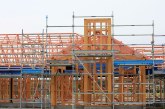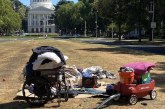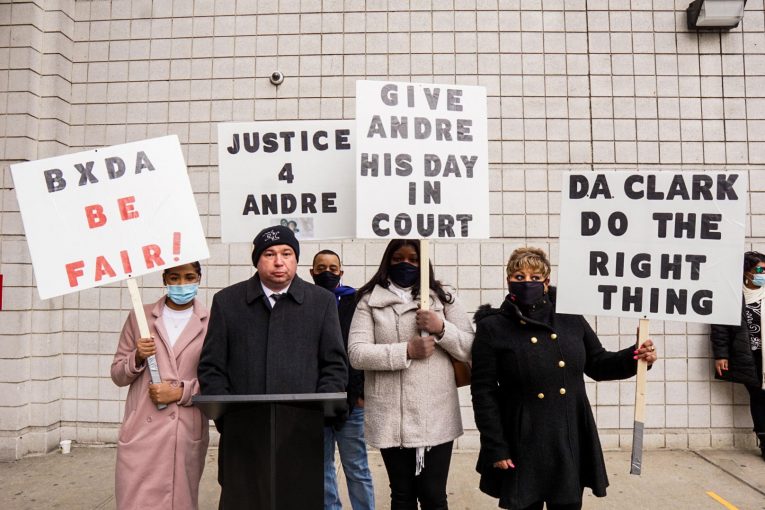
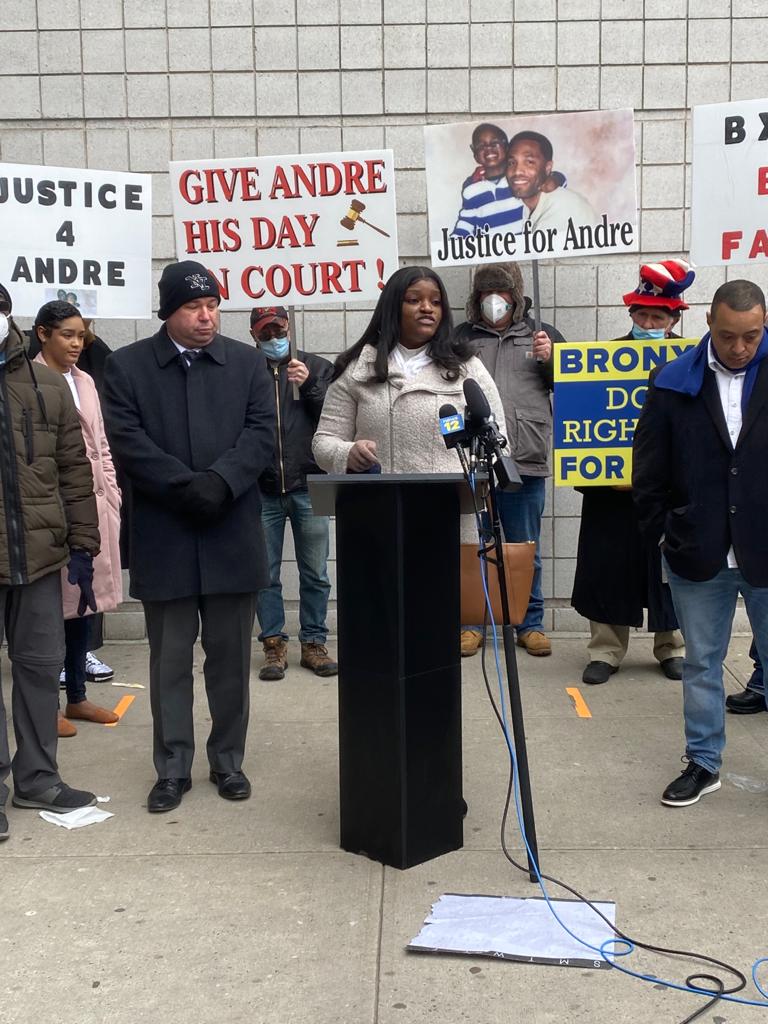
By David Greenwald
It has been a year since Bronx Supreme Court Judge David Lewis granted a motion for Andre Brown, who supporters believe has been wrongly incarcerated for 22 years, to have an evidentiary hearing. However, with COVID hitting shortly after the judge’s ruling and shutting down the courts, he is still waiting.
Judge Lewis advised the parties that he was ready and willing to proceed with the hearing virtually, but the ADAs assigned to the case told Judge Lewis that their office would not consent.
Attorneys for Brown, Oscar Michelen and Jeffrey Deskovic, have filed a motion asking Judge Lewis to grant the hearing over the objection of the DA, and family and supporters hope that public pressure can get the DA’s office to relent.
Attorney Oscar Michelen explained to the Vanguard at Tuesday’s rally, “It’s the form of an olive branch to the DA, to do the right thing and not oppose a virtual hearing.”
He explained, “We’re not asking for her to agree that Andre is innocent, we’re not asking for anything in that concern at all. All we want is to be allowed to proceed virtually.”
Michelen said that they are hoping a little public pressure will change the minds of the DA’s office to allow this to go forward.
“At the same time we filed a pretty strong motion, so it’s not as though we don’t think we have legal grounds for the virtual hearing,” he said. “It would be smoother if they just consent.”
While Michelen is confident, he admits that the DA has a point about the letter of the law. The executive order says “on consent of all parties,” he acknowledged. But Michelen said he believes it means “all parties of interest” and the DA “has no real skin in the game.”
He also believes that the judge has the discretion to set procedures as long as it doesn’t violate substantive rights
“I’m confident we’re going to win” but “he said his hands are tied by the executive order,” he said.
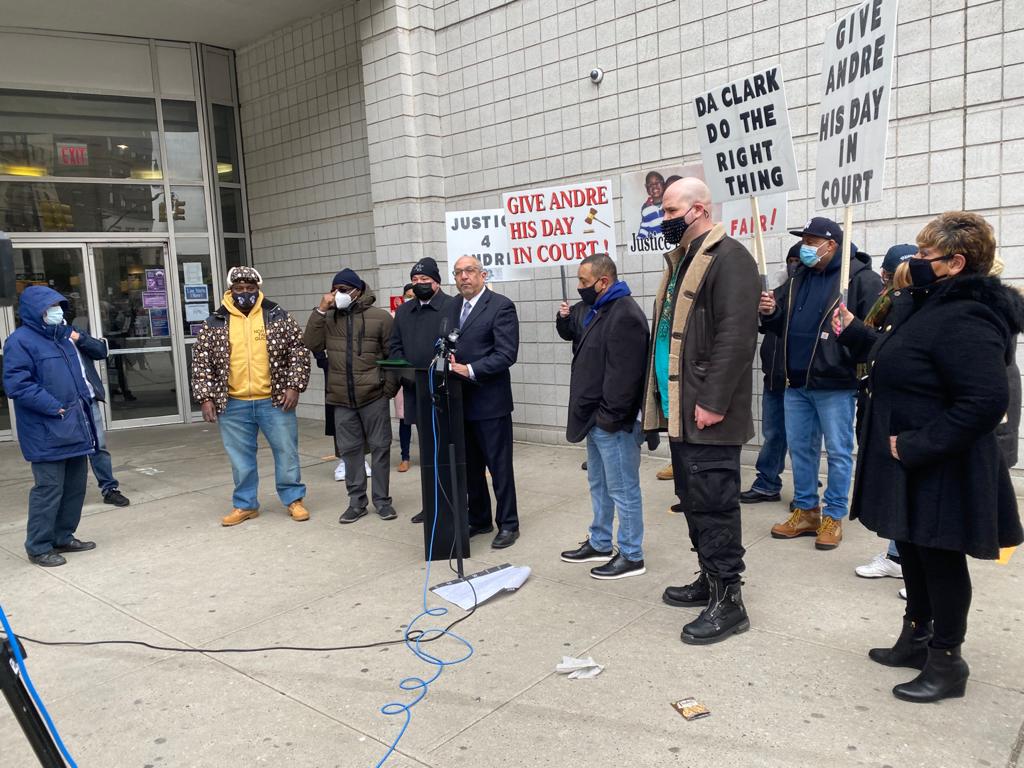
If they fail in their effort, how soon could they reasonably expect a hearing? Michelen is not optimistic there.
He said that on Monday the chief judge in NY said “for the foreseeable future” there is “no date” for return to normal proceedings and they will “remain virtual” until all court personnel are vaccinated. “That sounds like a long time for me,” he said. “We don’t know what it means.”
As he pointed out, this is not a small issue.
“You’re exposing someone to some very serious… every day in prison is life-threatening,” he said, noting an assault on Andre Brown last Thanksgiving.
Alan Newton is an exoneree himself, who spent 22 years for a rape and robbery he did not commit. He told the Vanguard that he knows how these things go.
“I know how a lot of times, they still try to CYA because it’s the politics of the office going on,” Newton said. “We have a district attorney who is formerly a judge so she understands the process and what’s going on.
“Give the man a day in court,” he said. “Like I told the family, the fact that it got this far, is a good sign.
“If it weren’t for the pandemic, they’d have a hearing already,” he said.
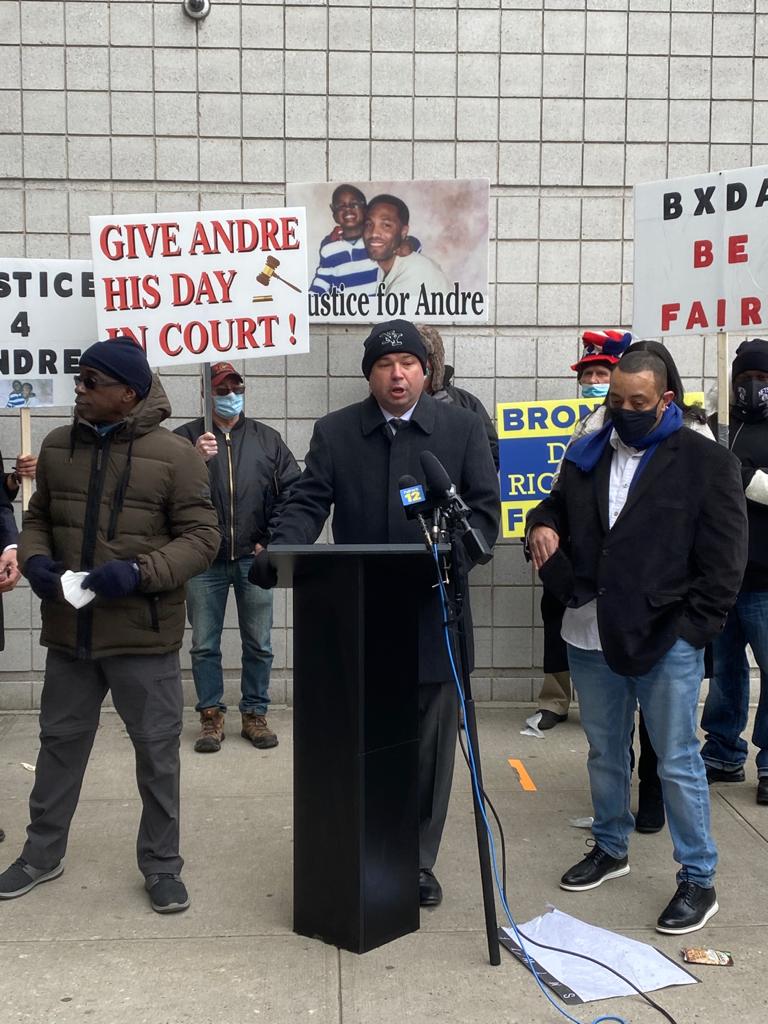
Also asking for a hearing was wife, Tameka, and niece, Alexis.
“We are out here to get justice for my uncle, he’s been incarcerated for 22 years. We’re just asking that the DA do the right thing and let him have his day in court,” Alexis said.
Tameka added that “he was wrongly convicted over 22 years ago for the shooting of two then-teenage boys in the Bronx.”
The story of Andre Brown’s case begins on January 15, 1999, when two teenage boys—O’Neill Virgo and Shawn Nicholson—were shot by a masked gunman in the Bronx. Virgo was seriously injured, and Nicholson, shot in the back as he ran away from the Virgo shooting, was paralyzed from the waist down.
Five days later, Brown, then a college student at the Borough of Manhattan Community College, turned himself in to police after he was allegedly identified as the shooter.
Later that evening, he was picked out of a lineup by a woman who said she recognized Andre while she was caught in traffic in the area where the shootings took place and that she allegedly saw the gunman as he chased after Nicholson.
Convicted of two counts of second-degree attempted murder in March of 2000, Brown was sentenced to 40 years in prison.
The evidence they have uncovered overwhelmingly points to the authorities having the wrong man.
“Two live witnesses who identify a different person than the shooter,” Oscar Michelen explained.
He added, “A doctor who will testify that he performed surgery on Andre’s leg a year before this and (he) could not have been involved in a foot chase.”
Moreover, the ballistics report, which the defense did not have at the time, tied the gun used to the same gun used a few days earlier.
“We have a mountain of new evidence as well as medical evidence to prove that he could not have committed this crime,” he said.
“It’s unfortunately common,” he said, responding to how Brown got convicted. “Because Andre was shot the year earlier, a known drug dealer back then in the neighborhood, a woman who has since recanted her testimony told police that they ought to look at Andre Brown. Once they looked it up and saw that he had been arrested for drug dealing and was shot last year, the police basically stopped looking.”
A woman who saw the shooting, saw the posters, knew Andre’s face, and decided that’s the guy she saw doing the shooting that day.
“She testifies at the grand jury but, at trial, Andre’s lawyer basically intimidates her and the court allows the grand jury evidence to be read—she was never cross-examined—this was really the only evidence against him,” Michelen continued.
“Basically justice delayed is justice denied,” Jeffrey Deskovic, himself an exoneree, and now an attorney with the Jeffrey Deskovic Foundation, explained.
“This case has a lot of the red flags of wrongful convictions,” he said. Eyewitness identification is a problem. Bad lawyering, that’s present in this case. “In this case we have an alternate suspect who was involved in the shooting with the victim just a few days before and that person physically resembles our client, and that furthers our argument of misidentification.
“But the DA not willing to do the hearing virtually, remember this is not about whether Andre’s entitled to a hearing, the judge already ruled that he is, this is about whether the DA is willing to do the hearing virtually, thus far her answer has been no, and that’s tantamount to denying Andre his day in court,” Deskovic said.
Bronx DA Spokesperson Denisse Moreno told the Vanguard, “The attorneys chose not to engage our Conviction Integrity Unit so this case is currently being handled by our Appeals Bureau and being litigated through the court.”
She added, “We cannot comment on pending litigation.”
Still, Andre Brown remains in good spirit, Tameka Brown told us.
“Surprisingly good,” she said. “He’s hopeful. He’s elated to see so many people coming here in support of him. He’s also saddened by the fact that we have to even go through all of this.”
—David M. Greenwald reporting
To sign up for our new newsletter – Everyday Injustice – https://tinyurl.com/yyultcf9
Support our work – to become a sustaining at $5 – $10- $25 per month hit the link:



